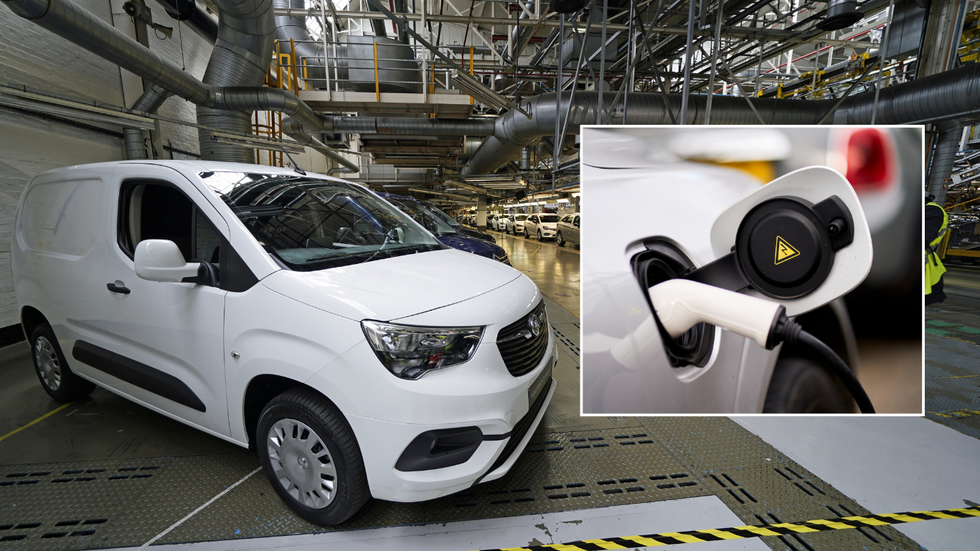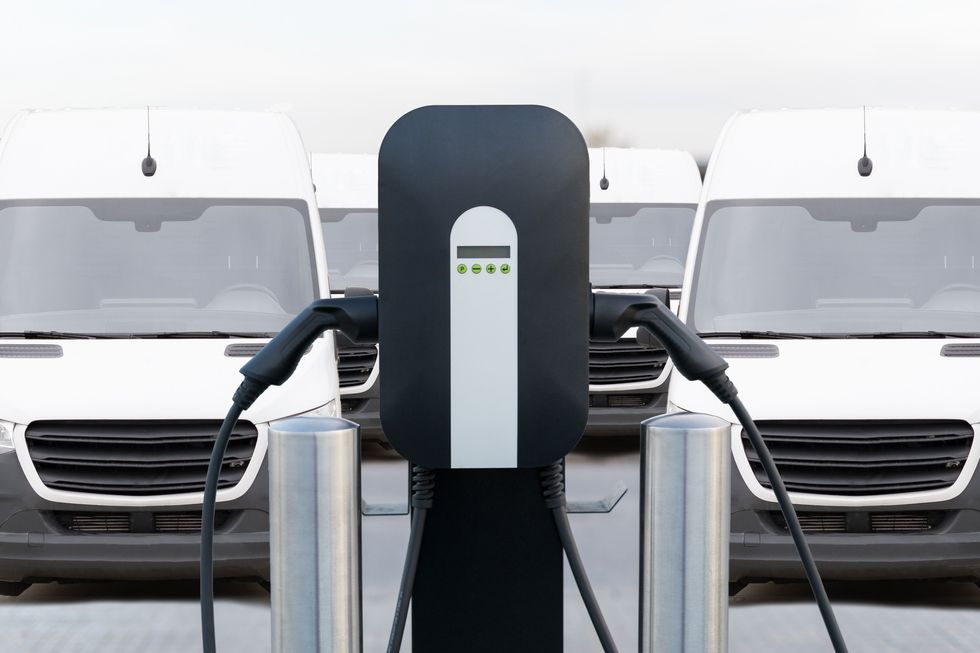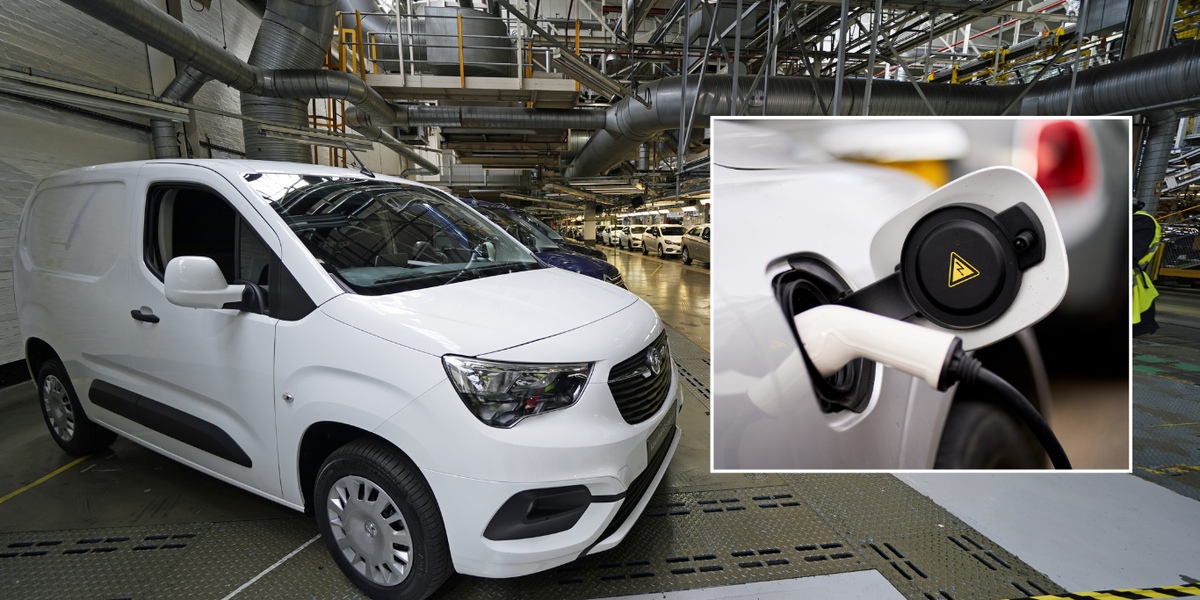High street banks offer up to £200 free cash ahead of Christmas – full list
WATCH: Department For Transport announces measures to make it cheaper to install electric vehicle charge points
DEPARTMENT FOR TRANSPORT
By Hemma Visavadia,
Published: 25/11/2025
The Department for Transport has revealed the results of its electric van consultation
Drivers of popular vehicles have been warned that they could see new road requirements and restrictions introduced under fresh proposals.
The Department for Transport published its response to a consultation examining regulations for heavier electric vans, which face additional requirements due to battery weight pushing them above the 3.5 tonne threshold.
The consultation looked at whether mandatory 56mph speed limiters on electric vans weighing between 3.5 and 4.25 tonnes should be reduced.
The Department for Transport revealed that ministers have committed to introducing legislation to ease MOT testing procedures and drivers' hours rules for these vehicles.
The measures aim to accelerate fleet transitions to electric vehicles by addressing regulatory barriers that currently discourage operators from choosing electric alternatives to conventional diesel vans.
The consultation revealed that 51 per cent of respondents opposed removing the speed limiter requirement, with only 37 per cent supporting its elimination.
Safety concerns dominated the feedback, with 65 respondents warning that removing limiters could increase collision risks, particularly on motorways where vehicles could exceed current restrictions.
"Speeding is a major contributory factor in traffic collisions. Without speed limiters, drivers of these heavier vehicles may travel at higher speeds, increasing the likelihood and severity of collisions," one respondent stated.
The transport authority acknowledged that while the 56mph restriction could theoretically affect motorway speeds, most respondents viewed limiters as essential for road safety rather than a barrier to electric van adoption.

The consultation looked at changing speed limits for electric vans as well as introducing new MOT rules
|
PA/GETTYMinisters confirmed that any future changes would require a targeted consultation to gather additional evidence on safety implications.
The Government will introduce legislation moving these electric vans from Heavy Goods Vehicle testing into the class 7 MOT system, following support from 82 per cent of consultation respondents.
Under the new arrangements, vehicles will undergo their first test three years after registration rather than after one year, then annually thereafter.
Fleet operators particularly welcomed the change, citing reduced administrative burdens and lower costs compared to current HGV testing requirements.
LATEST DEVELOPMENTS
- BMW, Audi, Mercedes and more axe Motability schemes amid severe backlash from Britons
- Labour urged to step up support as national EV charging inequality prompts serious concern – 'Clear gaps'
- Labour targets major driving offence for first time in 10 years under tougher proposals – 'We will catch you'
Meanwhile, data from operators showed no increase in collision rates for heavier low emission vans compared to lighter diesel equivalents, though the Department pledged to monitor safety impacts through post-implementation reviews.
Ministers plan to transfer these vehicles from complex assimilated drivers' hours regulations to simpler GB rules, following backing from 67 per cent of consultation participants.
The change aims to address concerns that current requirements discourage electric van adoption, with operators citing administrative complexity and costs associated with tachograph systems.
Under the Zero Emission Vehicle mandate, all new vans sold in the UK will be zero emission by 2035.

The consultation looked at adding more flexibility to MOT testing rules
|
GETTY"This change would greatly reduce the operational and administrative burdens currently placed on operators managing these vehicles, particularly those with mixed fleets of ZEGVs and diesel equivalents," respondents noted.
Under existing assimilated rules, drivers may work up to 13 hours daily, while GB regulations limit this to 11 hours with a 10-hour driving maximum.
The Department for Transport said it will explore legislative options for implementing the change, subject to post-implementation monitoring of any impacts on driver fatigue or compliance rates.
Toby Poston, chief executive of the British Vehicle Rental and Leasing Association, praised the announcement as "a great result for the van sector" that addressed longstanding industry concerns.
"Today's progress underlines what can be achieved when an industry comes together with a shared voice, met by Government representatives that are ready to listen," Mr Poston said.
Our Standards: The GB News Editorial Charter
The consultation looked at whether mandatory 56mph speed limiters on electric vans weighing between 3.5 and 4.25 tonnes should be reduced.
The Department for Transport revealed that ministers have committed to introducing legislation to ease MOT testing procedures and drivers' hours rules for these vehicles.
The measures aim to accelerate fleet transitions to electric vehicles by addressing regulatory barriers that currently discourage operators from choosing electric alternatives to conventional diesel vans.
The consultation revealed that 51 per cent of respondents opposed removing the speed limiter requirement, with only 37 per cent supporting its elimination.
Safety concerns dominated the feedback, with 65 respondents warning that removing limiters could increase collision risks, particularly on motorways where vehicles could exceed current restrictions.
"Speeding is a major contributory factor in traffic collisions. Without speed limiters, drivers of these heavier vehicles may travel at higher speeds, increasing the likelihood and severity of collisions," one respondent stated.
The transport authority acknowledged that while the 56mph restriction could theoretically affect motorway speeds, most respondents viewed limiters as essential for road safety rather than a barrier to electric van adoption.
The consultation looked at changing speed limits for electric vans as well as introducing new MOT rules
Ministers confirmed that any future changes would require a targeted consultation to gather additional evidence on safety implications.
The Government will introduce legislation moving these electric vans from Heavy Goods Vehicle testing into the class 7 MOT system, following support from 82 per cent of consultation respondents.
Under the new arrangements, vehicles will undergo their first test three years after registration rather than after one year, then annually thereafter.
Fleet operators particularly welcomed the change, citing reduced administrative burdens and lower costs compared to current HGV testing requirements.
Meanwhile, data from operators showed no increase in collision rates for heavier low emission vans compared to lighter diesel equivalents, though the Department pledged to monitor safety impacts through post-implementation reviews.
Ministers plan to transfer these vehicles from complex assimilated drivers' hours regulations to simpler GB rules, following backing from 67 per cent of consultation participants.
The change aims to address concerns that current requirements discourage electric van adoption, with operators citing administrative complexity and costs associated with tachograph systems.
Under the Zero Emission Vehicle mandate, all new vans sold in the UK will be zero emission by 2035.
The consultation looked at adding more flexibility to MOT testing rules
"This change would greatly reduce the operational and administrative burdens currently placed on operators managing these vehicles, particularly those with mixed fleets of ZEGVs and diesel equivalents," respondents noted.
Under existing assimilated rules, drivers may work up to 13 hours daily, while GB regulations limit this to 11 hours with a 10-hour driving maximum.
The Department for Transport said it will explore legislative options for implementing the change, subject to post-implementation monitoring of any impacts on driver fatigue or compliance rates.
Toby Poston, chief executive of the British Vehicle Rental and Leasing Association, praised the announcement as "a great result for the van sector" that addressed longstanding industry concerns.
"Today's progress underlines what can be achieved when an industry comes together with a shared voice, met by Government representatives that are ready to listen," Mr Poston said.
Our Standards: The GB News Editorial Charter











